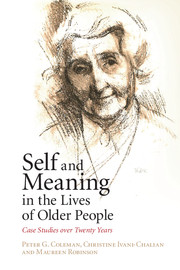Book contents
- Frontmatter
- Dedication
- Contents
- Preface and acknowledgements
- 1 Living a long life – why survive?
- 2 From self-esteem to meaning – studying psychological well-being in later life
- 3 Investigating older people's lives at the end of the twentieth century
- 4 Ageing together
- 5 Adaptation to loss of spouse
- 6 Ageing alone
- 7 Women becoming frailer
- 8 Men becoming frailer
- 9 Towards one hundred years
- 10 The future of later life: personal and policy perspectives on ageing and meaning
- Appendix: Participant characteristics
- References
- Index
2 - From self-esteem to meaning – studying psychological well-being in later life
Published online by Cambridge University Press: 05 May 2015
- Frontmatter
- Dedication
- Contents
- Preface and acknowledgements
- 1 Living a long life – why survive?
- 2 From self-esteem to meaning – studying psychological well-being in later life
- 3 Investigating older people's lives at the end of the twentieth century
- 4 Ageing together
- 5 Adaptation to loss of spouse
- 6 Ageing alone
- 7 Women becoming frailer
- 8 Men becoming frailer
- 9 Towards one hundred years
- 10 The future of later life: personal and policy perspectives on ageing and meaning
- Appendix: Participant characteristics
- References
- Index
Summary
In this chapter, we present the rationale for collecting the material reported in this book and describe the actual processes involved in the study on which it is based. As in all research projects, the data we sought reflected the particular interests of the investigators and the key theoretical concepts and health and welfare concerns that were influential at the time the research was being planned. Our project originated in a multidisciplinary longitudinal study of ageing initiated by the Departments of Geriatric Medicine and of Psychology at the University of Southampton in the later 1970s. There were two distinct stages of data collection. The interviews conducted in the first ten years included clinical assessment as well as questionnaires, whereas a more focused investigation of psychological well-being involving in-depth interviewing was undertaken in the latter ten and more years. After a brief description of the history of the main study, we continue with a reflection on the main theoretical ideas and observations that inspired our investigation into identity and well-being in later life. We close with a consideration of our reasons for conducting detailed case studies on our surviving participants in the second part of the project.
Southampton Ageing Project
The original Southampton Ageing Project sample comprised 340 persons aged over sixty-five years (born before 1914) recruited in 1977–8 from two general medical practices in Southampton. The participants were originally recruited as part of a two-year double-blind trial of an early ‘anti-ageing’ pharmaceutical product, Gerovital (KH3; comprising principally procaine/haematoporphyrin) on the processes of ageing – in particular, on cognitive functioning and mood (Hall et al., 1983). Some small beneficial effects were found in regard to grip strength, as well as avoidance of incontinence and decline in cognitive performance, but there was no observable impact on depressive symptoms. However, the generous nature of the funding allowed for substantial clinical, social and psychological data to be collected on each occasion, and thus the possibility of longitudinal as well as cross-sectional analysis.
- Type
- Chapter
- Information
- Self and Meaning in the Lives of Older PeopleCase Studies over Twenty Years, pp. 6 - 15Publisher: Cambridge University PressPrint publication year: 2015



